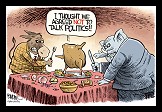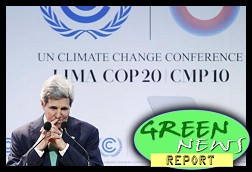 If there is a downside to the recently released executive summary of the U.S. Senate Torture Report [PDF], it can be found in the extraordinary lengths to which it goes to demonstrate a long-established fact: Torture is ineffective as a means for extracting actionable intelligence.
If there is a downside to the recently released executive summary of the U.S. Senate Torture Report [PDF], it can be found in the extraordinary lengths to which it goes to demonstrate a long-established fact: Torture is ineffective as a means for extracting actionable intelligence.
Emboldened by that focus, U.C. Berkeley Law Prof. John Yoo authored a response to the Senate Torture Report by way of a recent, Los Angeles Times op-ed. In 2002, while serving as the Deputy Assistant U.S. Attorney General, Yoo authored a memo that green-lighted CIA torture following the 9/11 attacks. The memo, according to UC-Irvine's renowned constitutional law professor Erwin Chemerinsky, should now serve as the basis for the prosecution of Yoo for war crimes. Shielded by the Obama/Holder Dept. of Justice's refusal to prosecute, Yoo shamelessly argued in his Los Angeles Times editorial that the newly released Senate Torture Report had shifted [emphasis added] "the debate beyond legality to effectiveness."
The issue of torture's "effectiveness" is not and never has been an appropriate subject for "debate." Robert Colville, the U.N. High Commissioner for Human Rights makes that clear in referencing the U.N. Convention against Torture, an international human rights treaty to which the U.S. is a signatory. "Torture is prohibited absolutely, in all circumstances, at any time," he explains in regard to the treaty signed by President Ronald Reagan. "It cannot be practiced in war, in peace, during emergencies, during internal instability, any circumstances whatsoever."
Those legal proscriptions apply not only to those who carry out torture but also, under the principle of "command responsibility," to high level officials who facilitate or fail to prevent torture by their subordinates.
As I revealed in my five-part series on the History of CIA Torture: Unraveling the Web of Deceit back in 2009, for me, torture is exceedingly personal. In late 1942 my father, James R. Canning, was waterboarded at Shanghai's Bridge House, an infamous torture chamber --- something that entailed a frightening, traumatic and "exquisitely painful," six-hour ordeal. He eventually signed a "false confession" stating that he was a British agent, even though he knew it wasn't true and even though he believed at that moment he was signing his own death warrant.
This Partial Trial Transcript [PDF] includes my father's testimony at the 1948 Hong Kong War Crimes Trials. It exposes the hypocrisy in the Obama/Holder DoJ's failure to apply the same ("command responsibility") legal standard to Yoo, former Vice President Dick Cheney --- who now proudly declares "I'd do it again in a minute!" --- and other high-level, Bush administration officials.
In 1948, that "command responsibility" standard was used to convict Lt. General Eiichi Kinoshida, who received a life sentence even though there was no evidence he personally participated in torture.
If we are indeed, as proclaimed by Sen. Diane Feinstein (D-CA) in her Forward to the Senate Torture Report, a "nation of laws," President Obama will heed the calls now being made by the ACLU, Human Rights Watch and even by The New York Times to appoint a special prosecutor who would investigate the crimes the CIA allegedly committed at the behest of Cheney et al --- crimes that appear as heinous and more so than those that were inflicted upon my father and his fellow civilian inmates during World War II...


 Sunday 'No Such Agreement' Toons
Sunday 'No Such Agreement' Toons How (and Why!) to 'Extend an Olive Branch' to MAGA Family Members Over the Holidays: 'BradCast' 11/21/24
How (and Why!) to 'Extend an Olive Branch' to MAGA Family Members Over the Holidays: 'BradCast' 11/21/24 'Green News Report' 11/21/24
'Green News Report' 11/21/24
 Former Federal Prosecutor: Trump Must Be Sentenced in NY Before Taking Office Again: 'BradCast' 11/20/24
Former Federal Prosecutor: Trump Must Be Sentenced in NY Before Taking Office Again: 'BradCast' 11/20/24 'Bullet Ballot' Claims, Other Arguments for Hand-Counting 2024 Battleground Votes: 'BradCast' 11/19/24
'Bullet Ballot' Claims, Other Arguments for Hand-Counting 2024 Battleground Votes: 'BradCast' 11/19/24 'Green News Report' 11/19/24
'Green News Report' 11/19/24 Trump Already Violating Law (He Signed!) During Transition: 'BradCast' 11/18/24
Trump Already Violating Law (He Signed!) During Transition: 'BradCast' 11/18/24 Sunday 'Into the Gaetz of Hell' Toons
Sunday 'Into the Gaetz of Hell' Toons Computer Security Experts Ask Harris to Seek Hand-Counts Due to Voting System Breaches: 'BradCast' 11/14/24
Computer Security Experts Ask Harris to Seek Hand-Counts Due to Voting System Breaches: 'BradCast' 11/14/24 'Green News Report' 11/14/24
'Green News Report' 11/14/24 Trump Criminal Cases Fade, as GOP 'Does Not Believe in Rule of Law': 'BradCast' 11/13/24
Trump Criminal Cases Fade, as GOP 'Does Not Believe in Rule of Law': 'BradCast' 11/13/24 Climate Advocates Brace for Fight With Trump 2.0: 'BradCast' 11/12/24
Climate Advocates Brace for Fight With Trump 2.0: 'BradCast' 11/12/24 Let It All Out: 'BradCast' 11/11/24
Let It All Out: 'BradCast' 11/11/24 Not All Bad: Abortion Rights Won Big (Almost) Everywhere: 'BradCast' 11/7/24
Not All Bad: Abortion Rights Won Big (Almost) Everywhere: 'BradCast' 11/7/24 U.S. CHOOSES CONVICTED CRIMINAL, ADJUDICATED RAPIST: 'BradCast' 11/6/24
U.S. CHOOSES CONVICTED CRIMINAL, ADJUDICATED RAPIST: 'BradCast' 11/6/24 ELECTION DAY 2024: Tea Leaves, Probs for Voters, What's Next: 'BradCast' 11/5/24
ELECTION DAY 2024: Tea Leaves, Probs for Voters, What's Next: 'BradCast' 11/5/24 'Closing Arguments' for Undecideds, Third-Party Voters: 'BradCast' 11/4/24
'Closing Arguments' for Undecideds, Third-Party Voters: 'BradCast' 11/4/24 The GOP 'Voter Fraud' Before the Storm: 'BradCast' 10/31/24
The GOP 'Voter Fraud' Before the Storm: 'BradCast' 10/31/24
 VA GOP VOTER REG FRAUDSTER OFF HOOK
VA GOP VOTER REG FRAUDSTER OFF HOOK Criminal GOP Voter Registration Fraud Probe Expanding in VA
Criminal GOP Voter Registration Fraud Probe Expanding in VA DOJ PROBE SOUGHT AFTER VA ARREST
DOJ PROBE SOUGHT AFTER VA ARREST Arrest in VA: GOP Voter Reg Scandal Widens
Arrest in VA: GOP Voter Reg Scandal Widens ALL TOGETHER: ROVE, SPROUL, KOCHS, RNC
ALL TOGETHER: ROVE, SPROUL, KOCHS, RNC LATimes: RNC's 'Fired' Sproul Working for Repubs in 'as Many as 30 States'
LATimes: RNC's 'Fired' Sproul Working for Repubs in 'as Many as 30 States' 'Fired' Sproul Group 'Cloned', Still Working for Republicans in At Least 10 States
'Fired' Sproul Group 'Cloned', Still Working for Republicans in At Least 10 States FINALLY: FOX ON GOP REG FRAUD SCANDAL
FINALLY: FOX ON GOP REG FRAUD SCANDAL COLORADO FOLLOWS FLORIDA WITH GOP CRIMINAL INVESTIGATION
COLORADO FOLLOWS FLORIDA WITH GOP CRIMINAL INVESTIGATION CRIMINAL PROBE LAUNCHED INTO GOP VOTER REGISTRATION FRAUD SCANDAL IN FL
CRIMINAL PROBE LAUNCHED INTO GOP VOTER REGISTRATION FRAUD SCANDAL IN FL Brad Breaks PA Photo ID & GOP Registration Fraud Scandal News on Hartmann TV
Brad Breaks PA Photo ID & GOP Registration Fraud Scandal News on Hartmann TV  CAUGHT ON TAPE: COORDINATED NATIONWIDE GOP VOTER REG SCAM
CAUGHT ON TAPE: COORDINATED NATIONWIDE GOP VOTER REG SCAM CRIMINAL ELECTION FRAUD COMPLAINT FILED AGAINST GOP 'FRAUD' FIRM
CRIMINAL ELECTION FRAUD COMPLAINT FILED AGAINST GOP 'FRAUD' FIRM RICK SCOTT GETS ROLLED IN GOP REGISTRATION FRAUD SCANDAL
RICK SCOTT GETS ROLLED IN GOP REGISTRATION FRAUD SCANDAL VIDEO: Brad Breaks GOP Reg Fraud Scandal on Hartmann TV
VIDEO: Brad Breaks GOP Reg Fraud Scandal on Hartmann TV RNC FIRES NATIONAL VOTER REGISTRATION FIRM FOR FRAUD
RNC FIRES NATIONAL VOTER REGISTRATION FIRM FOR FRAUD EXCLUSIVE: Intvw w/ FL Official Who First Discovered GOP Reg Fraud
EXCLUSIVE: Intvw w/ FL Official Who First Discovered GOP Reg Fraud GOP REGISTRATION FRAUD FOUND IN FL
GOP REGISTRATION FRAUD FOUND IN FL






























 A few weeks ago, Francis Barry, whose
A few weeks ago, Francis Barry, whose  Proponents of Oregon's Measure 92, a GMO labeling initiative, are conceding defeat in what had become the most expensive ballot campaign in state history. The proponents from
Proponents of Oregon's Measure 92, a GMO labeling initiative, are conceding defeat in what had become the most expensive ballot campaign in state history. The proponents from 
 Incredibly enough, it's been ten years this month since we broke the story about vote-rigging software whistleblower Clint Curtis. It was certainly the biggest story we'd broken up until that time, in December of 2004, and, for some, it is still the story we may be best known for.
Incredibly enough, it's been ten years this month since we broke the story about vote-rigging software whistleblower Clint Curtis. It was certainly the biggest story we'd broken up until that time, in December of 2004, and, for some, it is still the story we may be best known for. In the tiny seaside town of Long Island, Maine --- and for the national media that followed it --- it was an inscrutable mystery fit for Murder She Wrote's Jessica Fletcher. Except that it wasn't murder at the heart of this mystery, it was a potentially 'stolen' election, which, upon additional investigation, has now been 'unstolen', with the state Senate candidate rightfully elected by the people of Maine's District 25 finally set to take her seat in the state legislature after another dramatic turn of events this week.
In the tiny seaside town of Long Island, Maine --- and for the national media that followed it --- it was an inscrutable mystery fit for Murder She Wrote's Jessica Fletcher. Except that it wasn't murder at the heart of this mystery, it was a potentially 'stolen' election, which, upon additional investigation, has now been 'unstolen', with the state Senate candidate rightfully elected by the people of Maine's District 25 finally set to take her seat in the state legislature after another dramatic turn of events this week. It's difficult to know where Rightwingers are now when it comes to the release of today's
It's difficult to know where Rightwingers are now when it comes to the release of today's 














